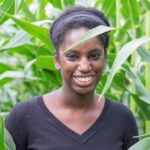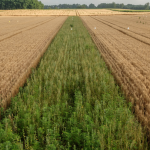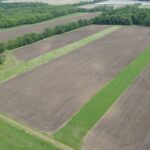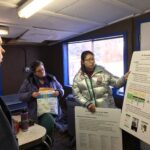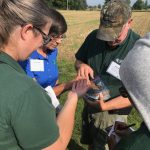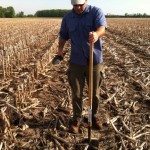A paper that examines best practices for improving soil health over time has been recognized as outstanding by the American Society of Agronomy, or ASA. The paper, spearheaded by W.K. Kellogg Biological Station resident faculty and MSU assistant professor Christine Sprunger, detailed research that was conducted at the KBS Great Lakes Bioenergy Research Center site. Tvisha Martin and Meredith Mann also contributed to the paper, titled “Systems with greater perenniality and crop diversity enhance soil biological health,” which was originally published in 2020 in the journal Agricultural
Little strips of prairie can go a long way
New research out of MSU shows that it is possible to manage farmland to address two challenges simultaneously – protecting biodiversity and maintaining ecosystem services. The key is to strategically place native perennial vegetation within agricultural systems, using the innovative practice of prairie strips. Today, 38% of the landscape in the Midwest is planted in row crop agriculture. “We need to make this land habitable for species for the ecosystem services the increased biodiversity can provide to the farms” said Lindsey Kemmerling, the first author of the MSU-led study
Prairie strip and soil health farm field day to be held in Cassopolis on August 26th
CASSOPOLIS, Michigan— A farm field day centered on prairie strips and soil health will be held on Friday, August 26th (September 2nd rain date) from 1:00- 3:00 p.m. at the Edward Lowe Foundation. The field day will feature speakers including farmers, land managers, and soil scientists who will describe the implementation, management, and soil health benefits associated with on-farm prairie strips. The event is free and open to the whole family and will include a soil pit demonstration, a wagon tour of prairie strips and refreshments. This field day is supported by Michigan State
Supporting Michigan farmers using soil health assessment tools: Reflections from an LTER fellow
Graduate researcher, Xinyi Tu, is a graduate student advised by Dr. Sieglinde Snapp in the Department of Plant, Soil and Microbial Sciences Department at Michigan State University (MSU). The term “soil health” is similar to that of the health of an organism – it originates from the underlying connection of soil to animal and human health, and to the connection between soil and its living biota. However, there is no concensus amongst scholars as to what soil health means, and various definitions can be found in the literature. This confusion translates to farmers through the creation
Educators gather for Soil Health Field Day at KBS
The following post is by Ava Garrison, graduate student in Jeffrey Conner's lab and Science Education and Outreach Fellow at the Kellogg Biological Station. Educators from across Michigan gathered at KBS for the 2019 LTER Soil Health Field Day, which took place on Wednesday, September 11. The day began with the driving question: how can we as educators share soil health science with our students? The attendees, who were educators from all grade levels including non-traditional and adult education, kept this question on their minds as they participated in the day’s
A new approach to soil testing for Michigan farmers: from inputs to indicators of soil health
Each year the KBS LTER program awards two graduate students with summer research fellowships. Here Brendan O'Neill describes the research his summer fellowship supported. Brendan is a Ph.D. student in Tom Schmidt and Phil Robertson's labs. ~~~ My research at the Kellogg Biological Station Long-term Ecological Research (KBS LTER) site has focused on how increasing crop diversity (for example, including cover crops) can enhance soil ecosystem functions while sustaining crop production. Examples of soil ecosystem functions include retaining carbon (C) and nitrogen (N) within the field and
